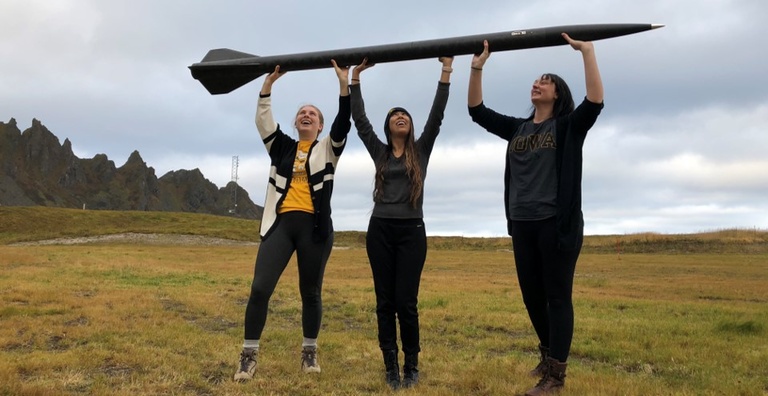Hannah Gulick works in a professor's lab in VanAllen Hall. Gulick was a Physics and Astronomy major at the University of Iowa involved in several projects, including receiving data from a satellite and traveling to Norway to build a rocket.
Breadcrumb
- Home
- Undergraduate Programs
- Experiential Learning
Experiential Learning
What is Experiential Learning?
What is Experiential Learning?
Experiential learning is an engaged learning process whereby students "learn by doing" and by reflecting on the experience. Experiential learning activities can include, but are not limited to, hands-on laboratory experiments, internships, practicums, field exercises, study abroad, undergraduate research and studio performances.
Research Opportunities
An advantage of attending a research I university is a greater opportunity for getting involved in research, which can be exciting, enjoyable, and even transformative in determining a career path. Such experiences can teach students how research is done and what questions are asked at the forefront of physics and astronomy. Students may learn in greater depth about a sub-area of physics, and gain new skills in measurement, analysis, and computation. Sometimes students contribute sufficiently that they are listed as a co-author on a scientific journal article. Such experiences are especially valuable for students wishing to go to graduate school to pursue a career in research. Gaining hands-on experience is an important complement to classroom learning for all students.
Students can do research with faculty members in multiple sub-disciplines of physics and astronomy, as described on our departmental Research and Creative Work pages. To get involved, students should browse these research areas and narrow down their interests. They should then contact faculty members whose research they find interesting to inquire about research opportunities, and the possibility of getting involved. Students should not get discouraged if they don’t find a position at first; knocking on doors can take some persistence, and all students are encouraged to make the effort. In addition to doing research with faculty, research opportunities are available on a competitive basis at other institutions, including government, academic, and industrial, across the country; see some of our links below.
Students can do research during the academic year and get paid for it for around ten hours a week. More in-depth and full-time research is possible during the summer months. The department offers funding for summer research through scholarships such as the Charles Wert Scholarship, and the Van Allen Research Grant; students can write a proposal in partnership with a faculty member. More details can be found under our awards and scholarships page. Funding is also possible from the University through the Iowa Center for Research by Undergraduates; more details can be found on the Vice President for Research webpages.
Internships

Internships/Cooperatives
Outside the Physics and Astronomy General Office (Room 203 Van Allen Hall) you'll find many internship/cooperative opportunities posted. Also be sure to check out these excellent sites listed below.
- Internships at NASA programs
- Summer REUs and Internships — Maintained by the Physics and Astronomy Dept. at Carleton College.
- National Academies Fellowships
- NRAO Summer Student Assistantships — Summer student research assistantship program at the National Radio Astronomy Observatory.
- STScI Summer Student Program and Graduate Research Assistantships — Available through the Space Telescope Science Institute.
University Resources
The University of Iowa provides general information concerning research, internships, studying abroad and experiential learning. For more information about these learning opportunities, please visit the following links:
Undergraduate Research: https://research.uiowa.edu/researchers/student-research/undergraduate-student-research
Internships: https://careers.uiowa.edu/internships/finding-your-internship
Study Abroad: https://international.uiowa.edu/study-abroad
Experiential Learning: https://careers.uiowa.edu/career-communities
Engaged Learning: https://engagement.uiowa.edu/students